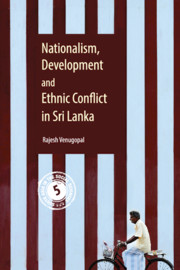Book contents
- Frontmatter
- Dedication
- Contents
- Figures
- Tables
- Preface
- 1 Nationalism, Development and Ethnic Conflict in Sri Lanka
- 2 Sinhala Nationalism
- 3 Kulaks to Clerks
- 4 The Politics of Market Reform at a Time of Ethnic Conflict
- 5 Military Fiscalism
- 6 The ‘Best and Last’ Chance for Peace
- 7 Cosmopolitan Capitalism
- 8 Sectarian Socialism
- 9 Conclusions: Elites, Masses and the Rajapaksa Presidency
- Bibliography
- Index
7 - Cosmopolitan Capitalism
Published online by Cambridge University Press: 01 November 2018
- Frontmatter
- Dedication
- Contents
- Figures
- Tables
- Preface
- 1 Nationalism, Development and Ethnic Conflict in Sri Lanka
- 2 Sinhala Nationalism
- 3 Kulaks to Clerks
- 4 The Politics of Market Reform at a Time of Ethnic Conflict
- 5 Military Fiscalism
- 6 The ‘Best and Last’ Chance for Peace
- 7 Cosmopolitan Capitalism
- 8 Sectarian Socialism
- 9 Conclusions: Elites, Masses and the Rajapaksa Presidency
- Bibliography
- Index
Summary
Today, Sri Lanka has a great window of opportunity. The United National Front (UNF) Government that came to power in December 2001 with a mandate to secure peace and accelerate economic growth has already embarked on a bold program of peace/reconciliation and a comprehensive set of economic policy/institutional reforms to promote private sector-led growth (World Bank 2003b: 1).
Introduction
This chapter is concerned with the United National Party (UNP) before and during their period in power as the leading partner in the United National Front (UNF) coalition government between December 2001 and April 2004. It broadly describes the circumstances under which their agenda for a ceasefire and negotiations with the LTTE came into being in the late 1990s, and develops an analytical narrative for its subsequent failure in terms of its economic agenda. The material presented in this chapter is not stand-alone, and is integrally connected to a historical contextual discussion, literature review, and issues of theoretical relevance discussed in preceding chapters, as well as to the subsequent chapter that discusses the JVP. Following from the questions raised in the previous chapter, this chapter explores the collapse of the 2001–2004 peace process, and in particular, why the Sinhala Buddhist majority turned against it in 2004.
The matter presented here is based largely upon primary material gathered during 2002–07, including personal interviews with a large number of people in the UNP-led government and party structure, including the prime minister, cabinet secretary, UNP chairman, and the treasury secretary. In addition, it draws on interviews and documents from members of leading corporate associations and aid donors, such as the Employers Federation, the Ceylon Chamber of Commerce, ‘business for peace’ NGO organisations, the World Bank and IMF. This material was combined and contrasted with a review of the available English language news media sources of that period, translated compilations of the vernacular media, financial statistics, secondary literature, and interviews with a number of trade unionists, opposition political parties, journalists, and civil society activists.
A Party in Reform
The UNP that came to power in December 2001, with an audacious agenda of ceasefire and negotiations with the LTTE, was a substantially different party from the one that had lost power seven years earlier in August 1994.
- Type
- Chapter
- Information
- Nationalism, Development and Ethnic Conflict in Sri Lanka , pp. 139 - 162Publisher: Cambridge University PressPrint publication year: 2018



